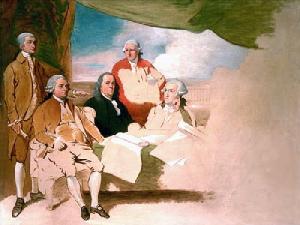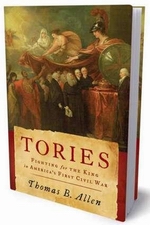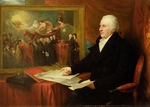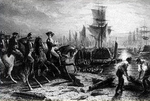|
Punishing the Tories
When the shooting war ended and negotiators
began working on a treaty, Tories in both England and America
wondered what would be their fate. Loyalist lobbyists in London had
been working throughout the war to have Loyalist efforts in the war
recognized by the Crown. They expected that they—and their
fellow Loyalists in America—would be recognized a serious issue
in the negotiations. But, when the treaty was announced, Loyalists
learned that an article in the Treaty of Paris made them only the
beneficiaries of a worthless clause that called upon Congress “to
recommend it to the legislatures of the respective States, to provide
for the restitution of all estates, rights and properties, which have
been confiscated.”

Benjamin
West’s
painting of the negotiators of the Treaty of Paris, which ended the
Revolutionary War: John
Jay, John
Adams, Benjamin
Franklin, Henry
Laurens, and
William
Temple Franklin,
Benjamin Franklin’s grandson, secretary of the American
delegation. Because the British delegation refused to pose, the
painting was not finished.
As all the negotiators—particularly the
Americans—well knew, there was no national American government,
and each state could do whatever its legislature wanted to do,
regardless of the treaty. And what the states had already done was
decide to punish Tories in ways that ranged from threatening them
with execution to seizing their property. Benjamin Franklin, one of
the negotiators, was the father of the last royal governor of New
Jersey, William Franklin. Ben Franklin made his grandson—illegitimate
son of an illegitimate son—the the
secretary of the American delegation.
Both Franklins had to know that New Jersey’s Rebel government
had, like all other states, long since passed laws confiscating Tory
property.
But. like the negotiators on both sides,
Franklin wanted the war to end and a treaty to be written and signed.
So no negotiator had any reason to delay the treaty by fighting for
an article guaranteeing to fair treatment for Loyalists. Instead,
they agreed to the cynical article that passed the issue to the
states.
Long
before the treaty, Congress recommended that
the states confiscate Tories’ property. Typically, the
properties were sold and the states pocketed the money.
States passed laws to ferret out and
punish Tories. Suspected Tories, for instance, were given “test
oaths”—declarations in which an oath-taker promised
not to aid the enemy, swore
loyalty to the Patriots, and denounced the
Crown.
Those who took the oath sometimes
received certificates for safety from arrest. In some states, anyone
who failed to take the oath faced imprisonment, confiscation of
property, banishment, and even death. Officers of the
Continental Army had to declare their loyalty to the United States
and, in a solemn oath, renounce George III, his heirs, and anyone who
aided the King. Major General Benedict Arnold was one of the officers
who placed his hand upon a Bible and swore the oath,
Tories
who refused to take the oath did not even have the right of
foreigners before the court. He had no way to collect debts and could
not be the executor of an estate. Lawyers and doctors who did not
take the oath lost the right to practice. Nine states passed acts
exiling prominent Tories, five states disenfranchised all Tories, and
most states expelled them from all offices and levied double or
treble taxes on them.
Anti-Tory
Laws Passed during the Revolutionary War
|
Connecticut:
Disfranchised and
deprive of office all members of the general assembly, civil and
military officers. Later extended this to freemen and all persons
over twenty-one; denied the right to be an executor or guardian.
1777: could be charged with treason or misprision of treason and
could be subject to prosecution for previous acts of disloyalty to
the state.
|
|
Date
of Laws
|
Affected
Persons
|
Penalty
of Refusal
|
|
Oct. 10, 1776.
|
Members of the general
assembly, civil and military officers. freemen.
|
Deprived of
office.
Disfranchised.
|
|
May 8 (?), 1777.
|
All persons over 21
years.
Freemen.
|
Shall hold no
office.
Disfranchised.
|
|
Oct. 11, 1777.
|
All persons who wish
to hold offices or vote,
|
|
|
May 12, 1777.
|
Those charged with
treason or misprision of treason.
|
Subject to prosecution
for previous acts of disloyalty to the state.
|
|
May 18, 1779.
|
(See “Public
Records of Conn.,” Vol. II, p. 279.)
|
|
|
Massachusetts
|
|
Date
of Laws
|
Affected
Persons
|
Penalty
of Refusal
|
|
1776
|
Every male person
above 16
|
Disarmed, unable to
hold office, ministers and school masters lose salaries —
also governors of Harvard College.
|
|
circa Jan. 1778.
|
Persons suspected of
being inimical (except Mandamus Councillors who accepted office,
and all who since April 19, 1775, have joined the enemy or
enlisted men for, etc.).
|
Committed to jail
(costs to be paid out of the estate of person). Within 40 days
sent to British territory.
Death penalty if return.
|
|
circa Jan. 1778.
|
Members of General
Assembly, civil and military officers, attorneys at law.
|
Not allowed to
practice.
|
|
circa June 1778.
|
Every military officer
under the commanding officer of regiment.
|
|
|
circa April, 1778,
addition to act of Jan., 1778.
|
Every military officer
under the commanding officer of regiment.
|
(Forty day’s
limit; “as soon as conveniently may be.”)
|
|
New
Hampshire
|
|
Date
of Laws
|
Affected
Persons
|
Penalty
of Refusal
|
|
Nov. 8, 1777
|
Civil and Military
officers, barristers and attorneys at law
|
Suspended from office
|
|
March 14, 1778 (an
addition to above act). (Time limit extended.) (Affirmation
instead of oath allowed.)
|
|
|
|
New
Jersey
|
|
Date
of Laws
|
Affected
Persons
|
Penalty
of Refusal
|
|
Sept. 19, 1776.
|
All civil and military
officers.
|
|
|
June 5, 1777 (an oath
giving chance for reconciliation).
|
Persons “who
have been seduced from their allegiance,” but “since
become sensible of their error.”
|
Forfeit personal
estate. Not allowed to transfer real estate.
|
|
Oct. 6, 1777.
|
Counsellors, proctors,
solicitors, attorneys, jurymen, public teachers and instructors.
|
£5 - £20
fine.
|
|
Oct. 1, 1778 (a
provision for those who have scruples against the oath).
|
Not
specifically stated
|
unknown
|
|
New
York
|
|
Date
of Laws
|
Affected
Persons
|
Penalty
of Refusal
|
|
Dec. 27, 1776 (res. of
a convention).
|
Inhabitants of
Westchester county.
|
Treated as open
enemies.
|
|
March 13, 1780 (an act
to relieve certain persons of Westchester).
|
|
|
|
June 30, 1778.
|
All persons of neutral
and equivocal characters who have influence sufficient to do
mischief.
|
Removed to any place
within the enemy’s lines. Names recorded. Those failing to
appear on summons guilty of misprision of treason. Lands double
taxed.
|
|
March 26, 1781.
|
All public officers
and electors.
|
Disfranchisement or
incapacity to hold office.
|
|
April 11, 1782.
|
Suitors in the courts
of the State.
|
Incapacity to sue.
|
|
Pennsylvania
compiled a “Black
List” of more than five hundred Tories who were judged to
have aided Britain and were attainted of high treason.
|
|
Date
of Laws
|
Affected
Persons
|
Penalty
of Refusal
|
|
June 13, 1777.
|
Male, white
inhabitants above 18 years.
Travelers (except Delegates for
Congress, prisoners of war, officers, soldiers, merchants and
mariners).
|
Unable to hold office,
serve on jury, sue for debts, elect or be elected, buy, sell or
transfer lands or tenements.
Disarmed.
|
|
October 12, 1777
(supplements above law).
|
Every inhabitant above
16 years who travels out of Philadelphia or the county in which he
resides.
Persons suspected of being unfriendly.
|
Committed to jail
without bail.
Jailed (costs levied on his goods).
|
|
April 1, 1778.
|
All persons over 18
(provision made for prisoners of war, unable to take the oath).
Delegates to Congress (had been exempt) now included.
|
Same as in Act of June
13, 1777; disabled to sue, etc., or be guardian or administrator
of any estate, cannot receive legacy or deed of gift or make will,
and shall pay double tax. (All trustees, provosts, rectors,
professors, masters, tutors, etc., merchants, traders,
sergeants-at-law, councillors-at-law, barristers, advocates,
attorneys, solicitors, proctors, clerks or notary, apothecary or
druggist, physician or surgeon) shall be incapacitated and upon
prosecution may be fined £500 (half to go to the estate and
half to the prosecutor), (persons summoned and refusing) committed
to jail for 3 months or pay £10. Disarmed; if by force, pay
double the value of the arms.
|
|
Dec. 5, 1778
(supplement above) (a new oath).
The law, modified in
April and October 1779, essentially renewed the earlier law.
|
All present and future
officers of Pennsylvania. Persons who have neglected previous
oath.
|
Not elect or be
elected or serve on juries (other penalties removed) except
non-jurors paying double tax.
|
|
Rhode
Island
|
|
Date
of Laws
|
Affected
Persons
|
Penalty
of Refusal
|
|
June, 1776.
|
All male inhabitants
above 16 years, who are suspected of being inimical.
|
May be summoned to
give reason.
Arms and ammunition seized (state to pay for
arms).
|
|
July 18, 1776.
|
Male person aged 21.
|
Cannot petition to set
aside judgment or stay execution.
Suit, action, bill, or plaint
dismissed.
Not vote in town meeting.
|
|
Sept., 1776.
|
|
Cannot hold office,
civil or military.
|
|
Delaware
|
|
Date
of Laws
|
Affected
Persons
|
Penalty
of Refusal
|
|
May 18, 1778.
|
Every male white
person 21 years old.
(Officers and soldiers in pay of U.S.
excepted.)
|
Unable to hold office,
civil or military.
Disfranchised.
Unable to serve on jury.
|
|
June 26, 1778.
|
Inhabitants of the
state that have levied war against it (except some 46 proscribed
persons).
|
Estates confiscated.
(Those who took oath were denied franchise and right to hold
office.)
(Incapacity removed Jan. 27, 1790.)
|
|
Maryland
|
|
Date
of Laws
|
Affected
Persons
|
Penalty
of Refusal
|
|
Before Dec. 3, 1777.
(Additional clauses not concerning the
oath.)
|
Every free male above
18 years of age (except Quakers, Mennonites or Dunkers, who only
declare). (Soldiers and officers excepted.) Refugees to the state.
(Imprisoned.)
|
Pay treble tax in all
public and county assessments during life. (Tax to follow the
property.) Cannot sue. Fined, if acting as a merchant (without
oath). Not to practice law, physics or surgery or apothecary, nor
preach or teach or hold office or vote.
|
|
Between Mar. 17 and
Apr. 22, 1778
(Supplements above law.)
|
|
|
|
Between July 22 and
Aug. 15, 1779.
|
|
(Treble tax suspended
until Nov. 10.)
|
|
Nov. 8, 1779.
|
|
(Treble tax suspended
to Dec. 30.)
|
|
June 12, 1780.
|
|
Treble tax to be
collected on absentees.
|
|
1781.
|
|
Persons returning from
abroad, take oath, not pay tax.
|
|
Between Nov. 5, 1781,
and Jan. 22, 1782.
|
|
(Treble tax suspended
and disability to sue for debts, practice physic, or carry on
merchandise removed).
|
|
Virginia
|
|
Date
of Laws
|
Affected
Persons
|
Penalty
of Refusal
|
|
May, 1777.
|
All free-born males
above age of 16 (except imported servants). Persons coming from
any of the other States.
|
Disarmed (but must
attend muster). Incapable of holding office, serving on jury,
suing for debts, buying lands. Travelers committed to jail.
|
|
May, 1783 (repeals the
part subjecting Quakers and Mennonites to penalties).
|
|
|
|
May, 1779.
|
Every person by law
required to give assurance of fidelity. Governor and Privy
Council.
|
|
|
May, 1779 (providing
for those who have scruples against oaths).
|
|
|
|
Oct., 1780.
|
Persons in the
counties of Henry, Bedford, Pittsylvania, Botetourt, Montgomery
and Washington who have taken oath to Great Britain since 1776 and
who have not added any overt act criminal by law.
|
Prosecuted if taken
(pardoned if they take the oath).
|
|
North
Carolina
|
|
Date
of Laws
|
Affected
Persons
|
Penalty
of Refusal
|
|
Nov. 22, 1776 (an
opportunity to recant).
|
All who by taking arms
against United States, or adhering to, comforting or abetting the
enemy. Persons using disrespectful words about United States or of
this State. Does not extend to persons now in open enmity.
|
Incapable of bringing
any suit in any court. Cannot be sued, plead or make defence,
prosecute indictment, purchase or transfer lands, tenements, etc.
Same to be forfeited to State.
|
|
Jan., 1777.
|
Members of Council of
State.
|
|
|
South
Carolina
|
|
Date
of Laws
|
Affected
Persons
|
Penalty
of Refusal
|
|
April 6, 1776 (oath of
office).
|
All persons not having
commissions, who, by the laws of Great Britain, have hitherto
taken oaths of office, State officers, President, Privy
Councillors.
|
Loss of office.
|
|
March 28, 1778
(repeals old law).
|
Commander-in-chief and
members of Privy Council.
|
|
|
Oct. 17, 1778.
|
Members of Senate and
House of Representatives.
|
|
|
March 28, 1778.
|
Every free male above
certain age.
|
|
|
Oct. 9, 1778 (enlarges
the time for taking oath of March 28, 1778).
|
|
Must sell or dispose
of estate and depart. Death if they refuse to leave or return.
|
|
Feb. 17, 1779
(extension of time).
|
|
|
|
Georgia
|
|
Date
of Laws
|
Affected
Persons
|
Penalty
of Refusal
|
|
Aug. 20, 1781.
|
Those who took oath to
the British, but have since shown loyalty to the United States
|
Regarded as guilty of
“certain high crimes and misdemeanors.” (Banished, if
they later take sides with the British.)
|
|





